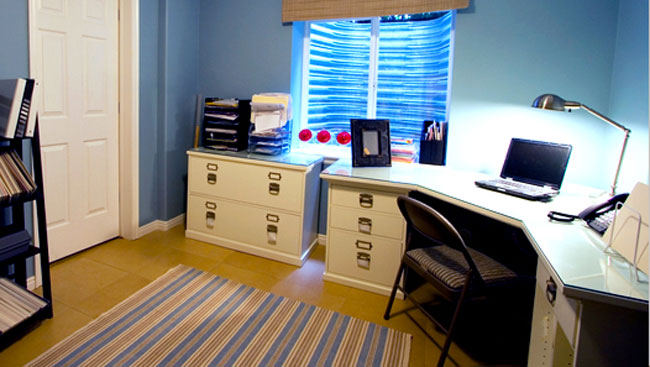If you’re ready to break free from your boring cubicle walls and create an office in your own home, designing your workspace is doable depending on a few key considerations. Understanding your needs in relation to what your office needs will take your space from inefficient and uncomfortable to organized and inspirational.
Creating a work space that is both stimulating and functional may take more planning than setting up your laptop and sitting on your couch. While that may work for some, who stay-at-home, there are several ways to make your space work for you while you work from home.
Whether you’re setting up shop in a closet or you’ve got a dedicated den, figuring out your functional needs will be your priority. “Depending on your job, your functional needs will be different than someone else,” says Karen Sealy, designer and owner of Sealy Design, Inc. “Understanding how you work and what you need before you do anything is really important.” Do you need access to a lot of files? Will you need a phone? Or a scanner? Do you need space to spread out your files? Will you have clients come visit? Asking yourself questions such as these will help you define what is necessary for you in an office before you break ground.
Organization is essential to keeping your home office efficient. “People have different ways of organizing. Some people are visual, they need to see it,” says Sealy, as she describes her clipboard system that allows her to easily keep track of all her jobs, including which need action and which are on hold. “One of the most important things in any office, regardless of what you do, is organization.”
Supplies should be stored depending on how often you need access to them. This may mean getting creative when it comes to combining an ample work area with sufficient storage especially if you’re working out of a non-traditional space. Asking yourself what you need nearby on a daily basis will allow you to keep track of where your essential supplies are stashed so you can easily access them. If you use the same pen and notebook everyday, keep it close. Alternatively, if you’re not printing often, your printer won’t need to take up space on your desk.

Ensuring you have enough storage for all your materials, whether they be craft supplies, papers or electronics, will help keep your space clean and organized. “Regardless of how you organize or how you work, just make sure it is clutter-free,” Sealy says. “Have a system – if you don’t have a home for all your stuff, it’s going to be out.” Keeping your workspace free of clutter allows you to focus on what you’re working to accomplish. “For a lot of people, if you have a cluttered workspace, you have a cluttered mind.”
If you don’t have a room that is solely your workspace, it will be important to consider how to maximize the area in which you choose to work. As Sealy suggests, a guest bedroom is always a bonus but if you only have guests once a year, turning that extra room into an office with a futon or couch is a much better use of your space than a bedroom with a desk stuffed in a corner or closet. Again, evaluating your needs will help you create a space that is most efficient for you. Your room may be multifunctional but make sure it’s functional for what makes sense for your life.
While staying organized will streamline your work flow, being comfortable will prolong it. If you plan to spend most of your day sitting at a desk, investing in a comfortable chair will be a priority. Sacrificing your comfort should never trump a trend when it comes to where you’ll be spending a significant amount of time. A major bonus to having your own home office is your ability to control both your lighting and temperature; you’re free to make the changes that will make you most comfortable.
Once you’ve identified your needs and how you’ll organize your office, decorating and accessories will easily fall into place. “The most important thing is to start with function. Once you have that, anything can be beautiful,” Sealy says.
A fresh coat of bright paint may liven up a corner or create a cozy nook. Your favourite art pieces or motivational prints allow you to infuse your office with personality and are easy on the eyes when you take a break from staring at your screen. If you don’t enjoy the space you’re spending your time in, your productivity will suffer. Taking the time to pick fresh colours, add useful accessories and coordinate your décor will leave you with a room worth working in.
The benefit of being at home is the freedom to create a space that is unique to you and your needs. Once a space is functional and organized, you’ll find working from home works for you.
PHOTO : sealy design inc







